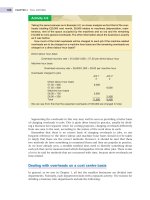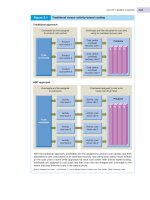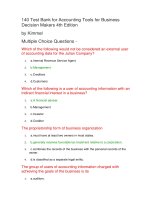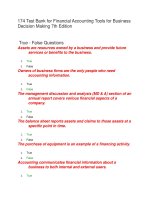Managerial economics economic tools for todays decision makers 7th edtion by keat young and erfle
Bạn đang xem bản rút gọn của tài liệu. Xem và tải ngay bản đầy đủ của tài liệu tại đây (171.06 KB, 22 trang )
Chapter 1
Introduction
Chapter Outline
• Economics and managerial decision making
• Review of economic terms and concepts
Copyright ©2014 Pearson Education, Inc. All rights reserved.
1-2
Learning Objectives
• Define managerial economics and discuss
briefly its relationship to microeconomics and
other related fields of study such as finance,
marketing, and statistics.
• Cite and compare the important types of
decisions that managers must make concerning
the allocation of a company’s scarce resources.
• Compare the three basic economic questions
from the standpoint of both a country and a
company.
Copyright ©2014 Pearson Education, Inc. All rights reserved.
1-3
Economics and Managerial Decision
Making
• Economics
–
–
–
–
The study of the behavior of human
beings in producing, distributing and
consuming material goods and
services in a world of scarce resources.
Copyright ©2014 Pearson Education, Inc. All rights reserved.
1-4
Economics and Managerial Decision
Making
• Management
– The science of organizing and allocating a
– firm’s scarce resources to achieve its
– desired objectives.
Copyright ©2014 Pearson Education, Inc. All rights reserved.
1-5
Economics and Managerial Decision
Making
• Managerial economics
– The use of economic analysis to make business
decisions involving the best use (allocation) of an
organization’s scarce resources.
Copyright ©2014 Pearson Education, Inc. All rights reserved.
1-6
Economics and Managerial Decision
Making
• Relationship to other business disciplines
Copyright ©2014 Pearson Education, Inc. All rights reserved.
1-7
Economics and Managerial Decision
Making
• Questions that managers must answer:
– What are the economic conditions in our
particular market?
• market structure?
• supply and demand?
• technology?
Copyright ©2014 Pearson Education, Inc. All rights reserved.
1-8
Economics and Managerial Decision
Making
• Questions that managers must answer:
– Should our firm be in this business?
• if so, at what price?
• at what output level?
• can the firm achieve a sustainable competitive
advantage?
Copyright ©2014 Pearson Education, Inc. All rights reserved.
1-9
Economics and Managerial Decision
Making
• Questions that managers must answer:
– What are additional economic conditions in our
particular market?
•
•
•
•
government regulations?
international dimensions?
future conditions?
macroeconomic factors?
Copyright ©2014 Pearson Education, Inc. All rights reserved.
1-10
Economics and Managerial Decision
Making
• Questions that managers must answer:
– What is our strategy to maintain a competitive
advantage in the market?
•
•
•
•
•
cost-leader?
product differentiation?
market niche?
outsourcing, alliances, mergers?
international perspective?
Copyright ©2014 Pearson Education, Inc. All rights reserved.
1-11
Economics and Managerial Decision
Making
• Questions that managers must answer:
– What are the risks involved?
•
•
•
•
changes in demand and supply conditions?
technological changes and the effect of competition?
changes in interest and inflation rates?
exchange rate changes for companies engaged in
international trade?
• political risk for companies with foreign operations?
Copyright ©2014 Pearson Education, Inc. All rights reserved.
1-12
Review of Economic Terms and
Concepts
• The economics of a business refers to the
key factors that affect the firm’s ability to
earn an acceptable rate of return on its
owners’ investment.
The most important of these factors are
• competition
• technology
• customers
Copyright ©2014 Pearson Education, Inc. All rights reserved.
1-13
Review of Economic Terms and
Concepts
• Microeconomics is the study of individual
consumers and producers in specific
markets, especially:
•
•
•
•
•
supply and demand
pricing of output
production process
cost structure
distribution of income
Copyright ©2014 Pearson Education, Inc. All rights reserved.
1-14
Review of Economic Terms and
Concepts
• Macroeconomics is the study of the
aggregate economy, especially:
•
•
•
•
•
national output (GDP)
unemployment
inflation
fiscal and monetary policies
trade and finance among nations
Copyright ©2014 Pearson Education, Inc. All rights reserved.
1-15
Review of Economic Terms and
Concepts
• Scarcity is the condition in which resources
are not available to satisfy all the needs and
wants of a specified group of people.
• Opportunity cost is the amount (or
subjective value) that must be sacrificed in
choosing one activity over the next best
alternative.
Copyright ©2014 Pearson Education, Inc. All rights reserved.
1-16
Review of Economic Terms and
Concepts
• The Nature of Scarcity
Copyright ©2014 Pearson Education, Inc. All rights reserved.
1-17
Review of Economic Terms and
Concepts
• Allocation decisions must be made because of
scarcity. Three choices:
What should be produced?
How should it be produced?
For whom should it be produced?
Copyright ©2014 Pearson Education, Inc. All rights reserved.
1-18
Review of Economic Terms and
Concepts
• 3 Systems to answer the what, how and for whom
questions
• Market process: The use of supply, demand,
and material incentives
• Command process: The use of the
government or some central authority
• Traditional process: The use of customs and
traditions
Copyright ©2014 Pearson Education, Inc. All rights reserved.
1-19
Review of Economic Terms and
Concepts
• 3 Basic economic questions - Country and
company
Copyright ©2014 Pearson Education, Inc. All rights reserved.
1-20
Review of Economic Terms and
Concepts
• Entrepreneurship is the willingness to take
certain risks in the pursuit of goals
• Management is the ability to organize resources
and administer tasks to achieve objectives
Copyright ©2014 Pearson Education, Inc. All rights reserved.
1-21
Summary
• Managerial economics is a discipline that combines
microeconomic theory with management practice.
• An important function of a manager is to decide
how to allocate a firm’s scarce resources.
• The application of economic theory and concepts
helps managers make allocation decisions that are
in the best economic interests of their firms.
Copyright ©2014 Pearson Education, Inc. All rights reserved.
1-22









